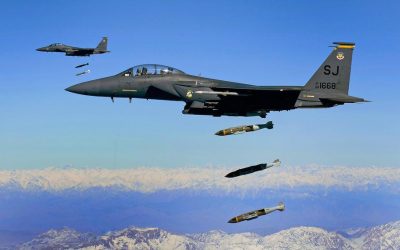US Bombs Somalia for the Third Time this Summer
These operations have been going on for 15 years straight — so long that mainstream media barely finds the energy to report on it.

All Global Research articles can be read in 51 languages by activating the “Translate Website” drop down menu on the top banner of our home page (Desktop version).
To receive Global Research’s Daily Newsletter (selected articles), click here.
Follow us on Instagram and Twitter and subscribe to our Telegram Channel. Feel free to repost and share widely Global Research articles.
***
The United States conducted another round of airstrikes in Somalia — the third this summer. If you were unaware that we were bombing Somalia, don’t feel bad, this is a completely under-the-radar news story, one that was curiously absent from the headlines in all of the major newspapers this morning.
Thanks to Dave DeCamp at Antiwar.com, however, we know that over a dozen of al-Shabab fighters were killed in an Aug. 14 operation by (US Africa Command) AFRICOM, as described in an official statement Wednesday. He writes:
US Africa Command (AFRICOM) announced the airstrike on Wednesday and claimed it killed 13 al-Shabaab fighters. The command said the strike was launched against al-Shabaab members that were attacking Somali government forces in a remote location near Teedaan, Somalia.
AFRICOM said its “initial assessment” found that “no civilians were injured or killed,” but the Pentagon is known for severely undercounting civilian casualties in Somalia.
The last US airstrike AFRICOM announced in Somalia took place on August 9, and before that was July 17. The escalation comes after President Biden ordered up to 500 troops to be sent to the East African nation, reversing a Trump-era drawdown.
The AFRICOM statement goes on to say that “US forces are authorized to conduct strikes in defense of designated partner forces.” There is no clarity on what that means, so we can only guess it is referring to the agreements the United States has with the fragile central government there, which is never not under siege by one militant opposition or another.
When pressed, the military would no doubt say that it is authorized to strike whenever it wants under the 2001 Authorization for the Use of Military Force because al-Shabaab is considered an al-Qaida offshoot. We know that justification is a stretch. Other justifications in the past have included “tactical defense” of U.S. forces and partners, which was used after questions were raised about a 2016 airstrike. Unfortunately, the mainstream media has given so little energy to sussing out authorizations anymore that it’s practically a moot point.
Al-Shabab, by the way, was created when the United States helped to overthrow the Islamic Courts Union after 9/11, which left a convenient vacuum for a new form of violent repressive rule to take hold in the embattled country. There was no serious al-Qaida presence in Somalia, but the U.S. military and CIA have been able to keep a foothold here, conducting over “several hundred declared and alleged US actions…involving drones, AC-130 gunships, attack helicopters, naval bombardments and cruise missile strikes – which between them according to local communities have killed scores of civilians” since 2007, according to Airwars.
There were 52 airstrikes in 2020 and nine since Biden took office, according to DeCamp.
Bottom line, it’s been a long time since the United States was not bombing Somalia. This comes after a particularly bloody period during the GWOT in which the CIA was using the country to detain and torture terror suspects from across North Africa. Whether this has ultimately been a good thing for the country or for the broader security of the region, one need only to look at the continued instability and impoverishment of the people, and of course, the persistent presence of al-Shabab itself.
*
Note to readers: Please click the share buttons above or below. Follow us on Instagram and Twitter and subscribe to our Telegram Channel. Feel free to repost and share widely Global Research articles.
Featured image: Air Force F-15E Strike Eagles drop 2,000-pound joint direct attack munitions. (Michael B. Keller/U.S. Air Force)

